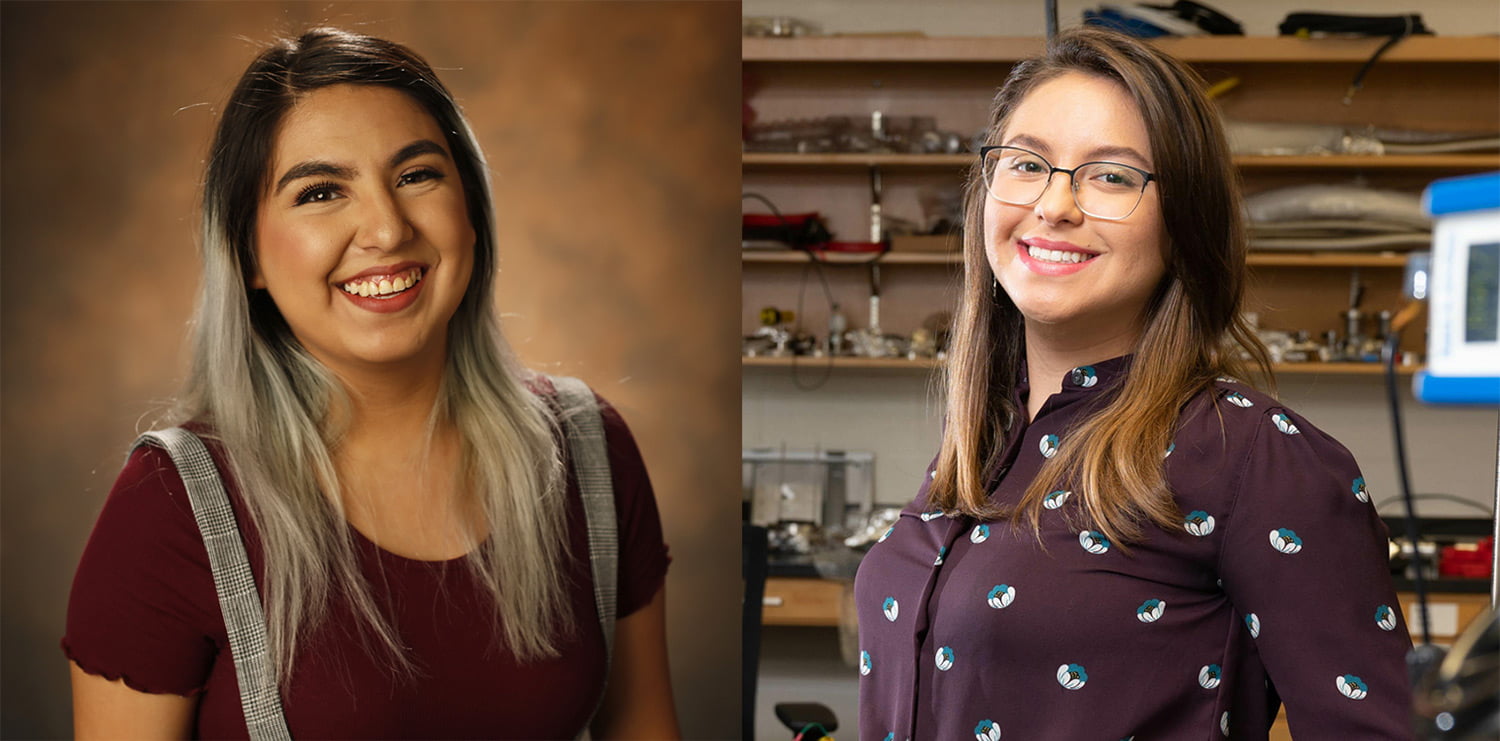UTA physicists encourage Hispanic participation in science

Jackie Baeza-Rubio and Denise Huerta know that the number of Hispanics who study physics and make their careers in the field is small. They are playing an active role in helping that change.
Baeza-Rubio, a junior in physics at The University of Texas at Arlington, and Huerta, who earned her bachelor’s degree in physics at UTA and is now a doctoral student at Notre Dame, are making unique contributions to the development of new techniques to study the neutrino, a subatomic particle with very small mass that travels at near lightspeeds and is very difficult to detect.
The pair was recently named to the board of the National Society of Hispanic Physicists (NSHP), an organization that works to encourage Hispanics to study physics. Huerta will serve as the graduate student representative and Baeza-Rubio will serve as the undergraduate student representative on the NSHP board for 2021-22.
The group’s purpose is to promote professional well-being and recognize the accomplishments of Hispanic physicists within the scientific community and society at large. The NSHP seeks to develop and support efforts to increase opportunities for Hispanics in physics and to increase the number of practicing Hispanic physicists, particularly by encouraging Hispanic students to enter the field.
Huerta and Baeza-Rubio, who are both first-generation college students, said they are honored by their appointments to the NSHP board and will work hard to represent the voices of Hispanic physics students.
“I will take my position very seriously in order to best serve my community of Hispanic physicists and represent us to the wider community,” Huerta said. “There aren't many of us, but we are growing and deserve to be seen and our achievements acknowledged, and I will do my best to help represent us.”
Baeza-Rubio said it’s important for Hispanics and women to have role models in science.
“Not having role models can steer Hispanic women away from STEM,” she said. “I’ve been lucky to have lots of mentors. Now with this NSHP position, I can make sure other students who faced or are facing challenges similar to mine have someone to look to for advice.”
Ben Jones, UTA associate professor of physics, was Huerta’s faculty mentor when she was working on her bachelor’s degree. He serves the same role for Baeza-Rubio, who began working in Jones’ lab group even before she enrolled at UTA.
“Jackie and Denise are both outstanding students, and it has been a real pleasure to supervise them as they take their first steps in physics research,” Jones said. “They are excellent role models, not only for Hispanic students in physics, but for all aspiring young scientists interested in contributing to the difficult but profoundly rewarding project of uncovering new fundamental truths about our universe.”
Huerta, who graduated from Richardson High School, said she chose UTA for many reasons: It was close to home; it is designated as a Hispanic-Serving Institution that has many resources for first-generation students; and it had lots of scholarship and grant opportunities. She started out as an aerospace engineering major but switched to physics in her sophomore year.
“My education has provided skills that can be used in different focuses in physics and outside the field as well,” she said. “I have learned about electronics, optics, coding, astronomy, material science and many other things that make every day as a physicist different and exciting. If one day I was to decide I want to change fields, I know I can take this knowledge and put it into action at any time.”
Huerta is in her first semester in the doctoral program at Notre Dame, working with the EMPHATIC collaboration, a hadron production experiment for improved neutrino flux predictions. She said it is important for her to be a role model to other Hispanics and women so they can see a pathway to success in physics.
“There are very few women, and even fewer Hispanic women, in physics,” Huerta said. “I hope that Jackie's and my presence inspires other women and underrepresented minorities to reach for their goals and explore their interest in physics. The field of physics is starting to diversify, and with higher representation comes fresh perspectives and new ideas that are key to new discoveries and advancements.”
Baeza-Rubio grew up in Grand Prairie and graduated from the Young Women’s Leadership Academy, a public school for grades 6-12. Following her sophomore year, she attended a High Energy and Nuclear Physics Summer Camp at UTA, which was organized by Jones. It served as her introduction to physics, and she was hooked.
When Baeza-Rubio joined the UTA research group as a high school intern, Huerta was an undergraduate student in the lab and was her first lab partner. When it came time to select a college, Baeza-Rubio’s choice came down to two main factors—cost and research—and UTA had the upper hand in both. She earned multiple scholarships, which when combined with the funds she receives as an undergraduate researcher, allow her to cover tuition and expenses.
“When I compared other physics departments to what we have here at UTA, I was much more satisfied with the sizes of labs, funding and, most importantly, my potential advisors here,” she said. “Dr. Jones was the best advisor by far. He was enthusiastic, and he’s also a first-generation college student—which is super important to me since he can guide me with my first-gen struggles—and he cares for me as a researcher, a student and a person.”
Jones said he looks forward to seeing the contributions the pair will make to the NSHP board. “It is truly gratifying to see UTA students and alumni assuming these important leadership roles in organizations dedicated to the important task of fostering inclusivity and improving the climate for physicists in our field,” Jones said.
- Written by Greg Pederson, College of Science